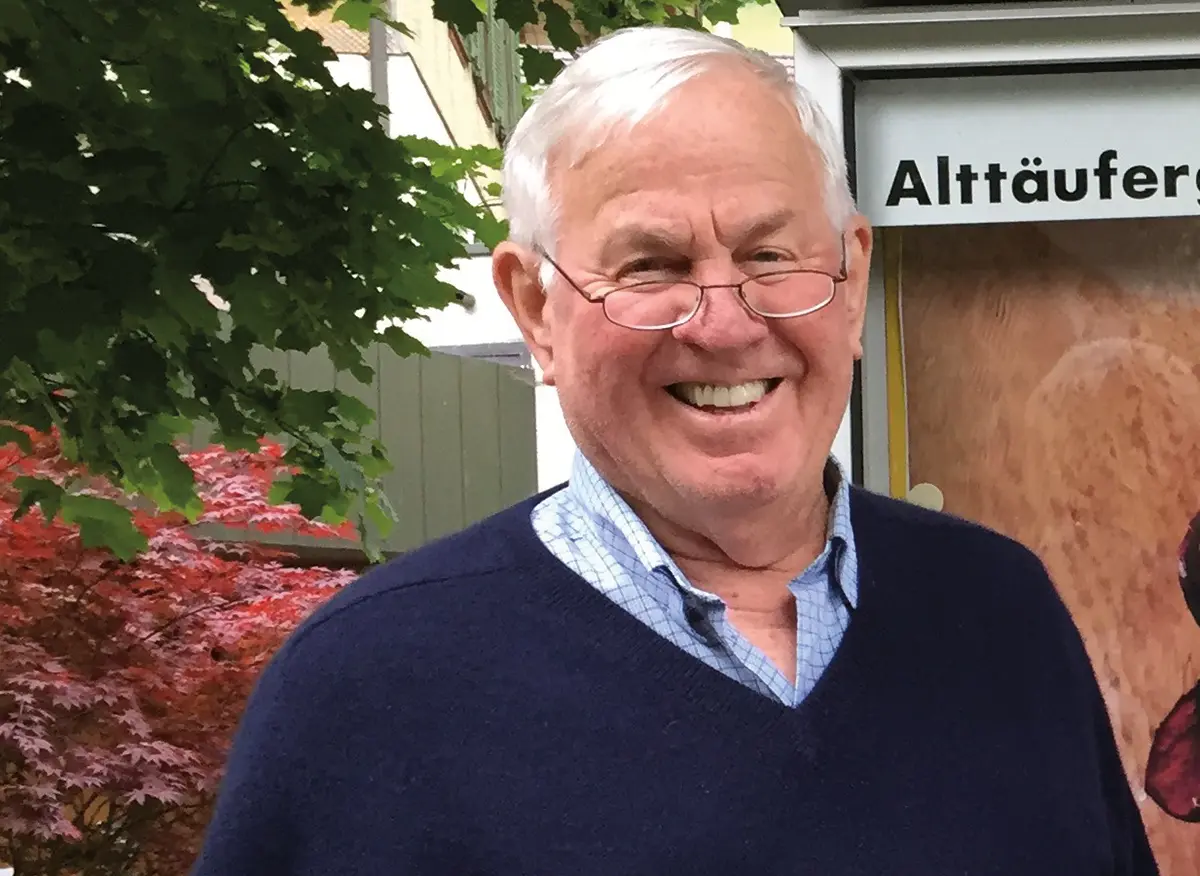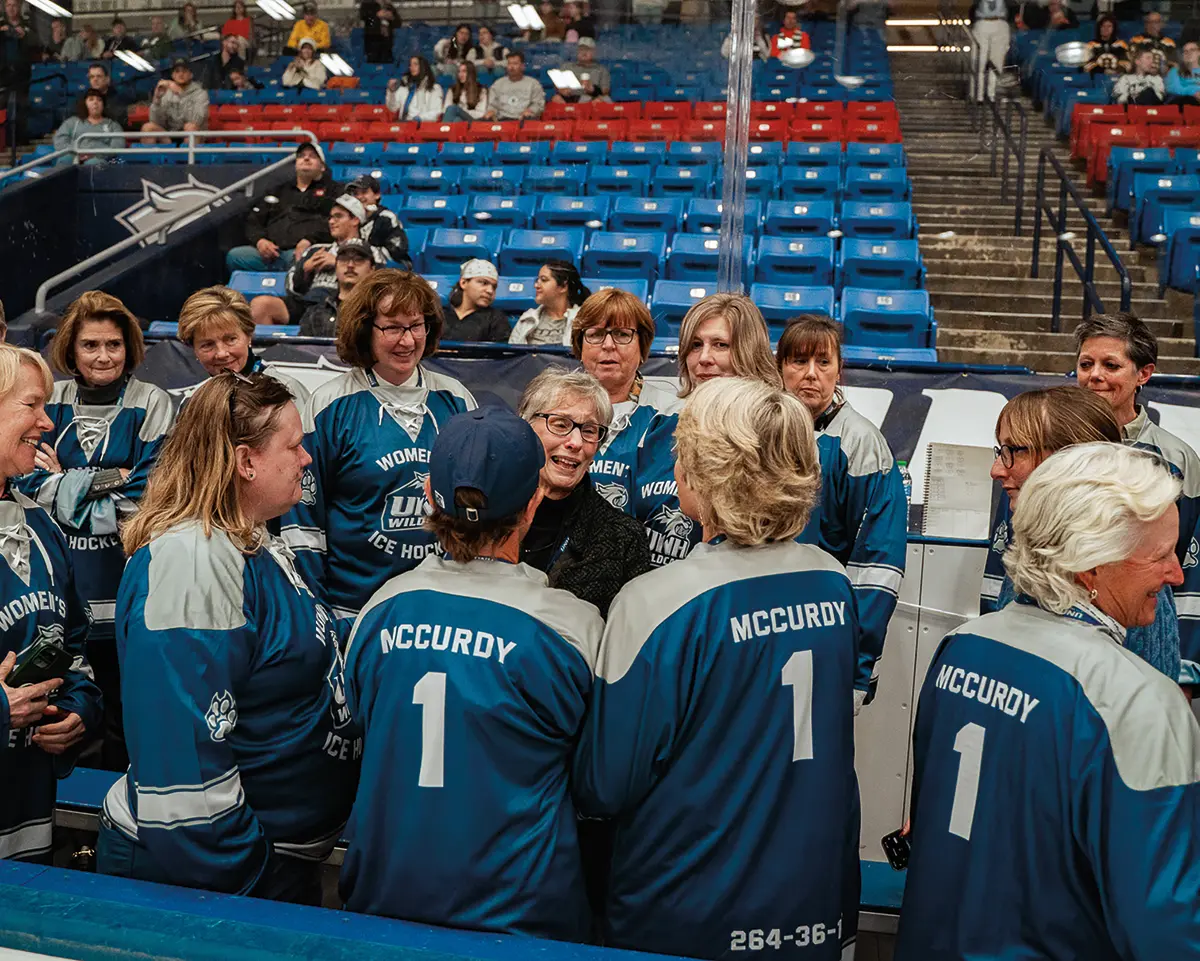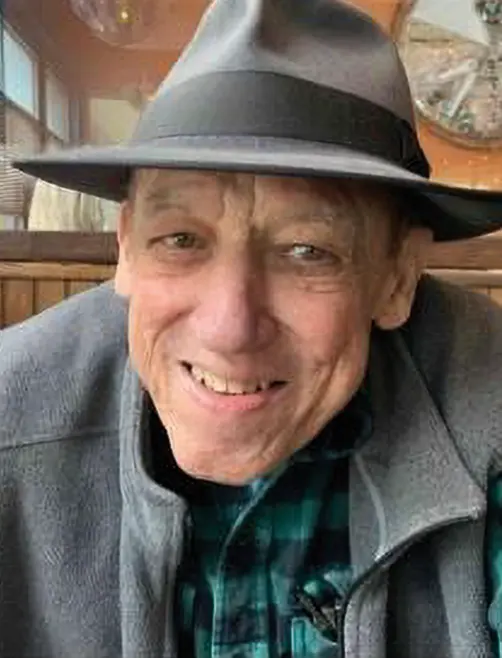Professor Emeritus Dwayne Wrightsman ’96

Wrightsman, a lifelong learner with interests ranging from classical music to genealogy, a skilled outdoorsman and enthusiastic traveler, passed away on August 14, 2024, from complications of dementia.
In 1964, after graduating from Manchester College in Indiana and earning a Ph.D. in economics from Michigan State University, Wrightsman came to UNH and taught at the Whittemore School of Business (predecessor of the Peter T. Paul College of Business and Economics) for 29 years before retiring in 1993. He wrote several textbooks in his field of finance and banking.
He was an exemplary professor, says David Greenlaw ’80, who remembers him as “an extremely influential presence in my life.” Throughout his own successful business career, Greenlaw has kept his notes from two of Wrightsman’s classes. “Dwayne’s lectures were a whirlwind of activity as he moved around the room drawing graphs and filling the whiteboard with equations. He was a storyteller in a sense. … It was like watching a movie director putting all the pieces together and building toward the concluding scene, which played out just as class ended.”
Greenlaw saved the notes because they represent an “elegance” not typically found in academic lectures. “By elegance, I mean that the material is presented in an incredibly well-organized fashion,” says Greenlaw, who majored in economics.
Over the years, the two men became friends, often meeting for lunch when Greenlaw visited campus while serving on the UNH Foundation Board.
Wrightsman was a member of several local music groups, including The Durham Chamber Singers. In 1976 he auditioned for, and was accepted into, Amare Cantare, an a capella chamber choir. His wife, Linda (Hoadley) Wrightsman ’78, whom he married in 1994, joined the group in 1999.
Wrightsman’s love of music developed in early childhood, encouraged by his musician father and his mother, an organist in the German Baptist Brethren Church in Virden, Illinois, where he sang as a boy.
When Wrightsman’s youngest son, Aaron Wrightsman ’15, began violin lessons at age 3, Wrightsman became immersed in the music, fascinated by the literature surrounding it, and loved being a “Suzuki Dad,” says Linda. He enrolled in UNH music courses, one at a time, until he had accumulated enough credits to matriculate in the graduate program, earning his master’s in 1996.
In retirement, Wrightsman kept busy researching his Anabaptist ancestors, writing genealogical articles and serving as a contributing editor to the journal Mennonite Family History.
Wrightsman’s broad interests and seemingly indefatigable energy extended to mountain climbing and skiing. He successfully ascended New England’s 67 4,000-foot peaks, proud of the certificates he received for his accomplishments.
Linda, who grew up skiing on Sunday afternoons with her family in Vermont, well remembers their first skiing adventure together. “When we first met, Dwayne discovered that I also skied, and he invited me to go to Cannon [Mountain] with him,” she says. “I didn’t understand that Dwayne’s idea of skiing was to get there when the lifts opened and to ski until they closed. I tried to keep up with him, but by 11 a.m., I was beyond exhausted and told him to ski as long as he liked, but I would be very happy relaxing in the lodge.”
In addition to Linda and Aaron, he is survived by sons Daniel and Nathan, two grandsons and extended family.
In 2005, his friend and former student David Greenlaw established the Dwayne Wrightsman Professorship in Finance in his honor. The fund provides support to reward current faculty or to recruit new faculty who have demonstrated outstanding academic accomplishments and contributions to the field of finance and macroeconomics.
“Dwayne left his stamp on me and, more importantly, on UNH,” says Greenlaw. “He will be missed.”

Russell McCurdy, former coach
As Weinberg-Hughes told the Union-Leader newspaper last summer: “We would use weighted pucks to go under cones so that our passing would be so precise. And we were probably one of the best passing teams out there.”
McCurdy, who also coached tennis at UNH for nine years, and who guided the Wildcat women’s ice hockey team to a 264-36-10 overall record for an .868 winning percentage in the first decade and a half of the program’s existence (1978–92), died on June 7, 2024, after a period of failing health.
He was celebrated at a game last fall, where more than 50 of his former players returned to campus, and his wife, Sheila, dropped the puck in remembrance of her husband and his legacy here.
UNH won the EAIAW championship all four years of its existence (1980-83) and the ’Cats won four ECAC titles under McCurdy’s direction.
A total of 13 women’s hockey players coached by McCurdy have been inducted into the UNH Athletics Hall of Fame, and that included four in the class of 1998. McCurdy himself was inducted in 2002.
A 1962 graduate of Boston University who went on to play for the 1962-63 U.S. National Team, McCurdy was in the U.S. Army Intelligence Corps, an investigator for the U.S. Civil Service Commission and a Foreign Service reserve officer with the U.S. Department of State before starting a career in coaching.
“He saw the potential for what it could be and he did the work to grow the program and the sport … all of women’s hockey,” Colleen Coyne ’92, who played on the first USA Olympics team that won gold in 1998, told the Union-Leader. “He was right there at the forefront, and for that I’m super grateful.”

Charter Weeks ’65
Weeks, who sailed, traveled, shot documentary photography around the world, took part in town politics and founded a Zen center, passed away on July 10, 2024. He was 81.
Weeks grew up in Durham, the son of longtime professor Silas Weeks. Much like his father, Charter was actively involved with civic activities and town government. He was proud of his role in preventing the construction of a four-lane highway from Rochester to Concord, which opponents believed would have all but destroyed the ecological, commercial and residential sensibilities of many small towns along the proposed route. He co-founded a community neighborhood of hand-built houses at Scruton Pond, where residents lived in cooperation with each other and the land.
He married poet Marie Harris in 1977, and the pair started their own communications firm. The couple eventually moved to Asheville, North Carolina. In October, months after Weeks’ passing, and just a few weeks after Hurricane Helene devastated the area, Marie shared with family and friends a nod to that communal living at Scruton Pond: “Where are my dug well, my wood stove, my outhouse when I need them? Where is my dear, vindicated Charter Weeks?”
He is survived by three sons, his wife Marie, a sister and several other family members. His family says that he was known for his generosity of spirit, even in his last act: donating his body to the University of North Carolina School of Medicine for research.
Ken Versprille ’69
It was his breakthrough research that created NURBS — non-uniform rational basis splines, key to mathematical models commonly used in computer graphics for representing curves and surfaces.
Versprille, whose work revolutionized computer-aided design, and whose discoveries created an international standard in CAD and computer graphics for industries from aerospace to animation, died on April 18, 2024.
As a math major, he realized he wanted to do more than focus on mathematical theory. “I wanted to experience its application in real problems,” he wrote in a Siemens blog post in 2013. He earned his master’s and doctoral degrees in computer science from Syracuse University in 1975.
He chose to attend UNH because of “my love for the New England landscape and a small college town experience — something that to this date I have never regretted,” he wrote.
It was a good choice for more than academic reasons: he met Kathleen Cram their freshman year in chemistry lab. Married for nearly 55 years, the Versprilles raised their family in Merrimack, in the home where they’ve lived since 1976.
Versprille applied his expertise in a variety of professional roles. At Computervision Corporation, he led the group that introduced and managed the first geometric kernel business in the CAD industry. In his later years, he worked as an industry analyst and consultant, and was recognized internationally for his contributions — he received a lifetime achievement award from The CAD Society in 2005.
Kathleen says that when her husband wasn’t working, the family enjoyed traveling and skiing — a sport he discovered at UNH.
In addition to his wife, Versprille is survived by his children, Kathryn ’98 ’00G (chemistry; materials sciences) and David ’02 (math and physics), and several grandchildren.
Priscilla Coffin ’68 ’71G
“As an older person living in a rural state, I want to see our young people stay,” she said in 2018, with the hope that helping a student avoid debt would allow them to be engaged in their community professionally and as a volunteer.
That was the kind of person Coffin was: honest, caring, direct and forthright about pretty much everything. The same was true when it came to her end-of-life plans: “Prilla” shared with those closest to her that she would be entering hospice care in May with the same directness.
She died on July 22, 2024, at the age of 79. Originally from Newbury, Massachusetts, she lived in Arundel, Maine, and Andover, Massachusetts. She was a founding member of the Foundation for Faces of Children, and worked at Merrimack Community College, the Maine School of Science and Mathematics and as a counselor with Maine State Vocational Rehabilitation.
She is survived by two children, her longtime partner Vivianne Holmes and a grandson.
As a 14-year-old at UNH’s Summer Youth Music School, she loved the freedom of living in Scott Hall and roaming the Durham campus. A decade later, as a transfer student in the Elizabeth DeMeritt House, she delighted in encountering the food and cultures of classmates from other countries. Many years later, a UNH Magazine article about the occupational therapy program inspired her to support it with a gift. She had experience developing adaptive technologies for a child born with craniofacial anomalies and saw, in hindsight, a program that might have suited her.
She likened helping to plan her 50th reunion to therapy: She and fellow volunteers discussed what a remarkable — and turbulent — time their college years had been and the different paths their lives had taken since, putting the past in a new light for Coffin. And she was awed to learn about classmates who had worked full-time or raised children while they were at UNH, sharing then: “I was so fortunate that my parents paid for my college education and that I had the flexibility to spend an extra year to enjoy my time at UNH.”